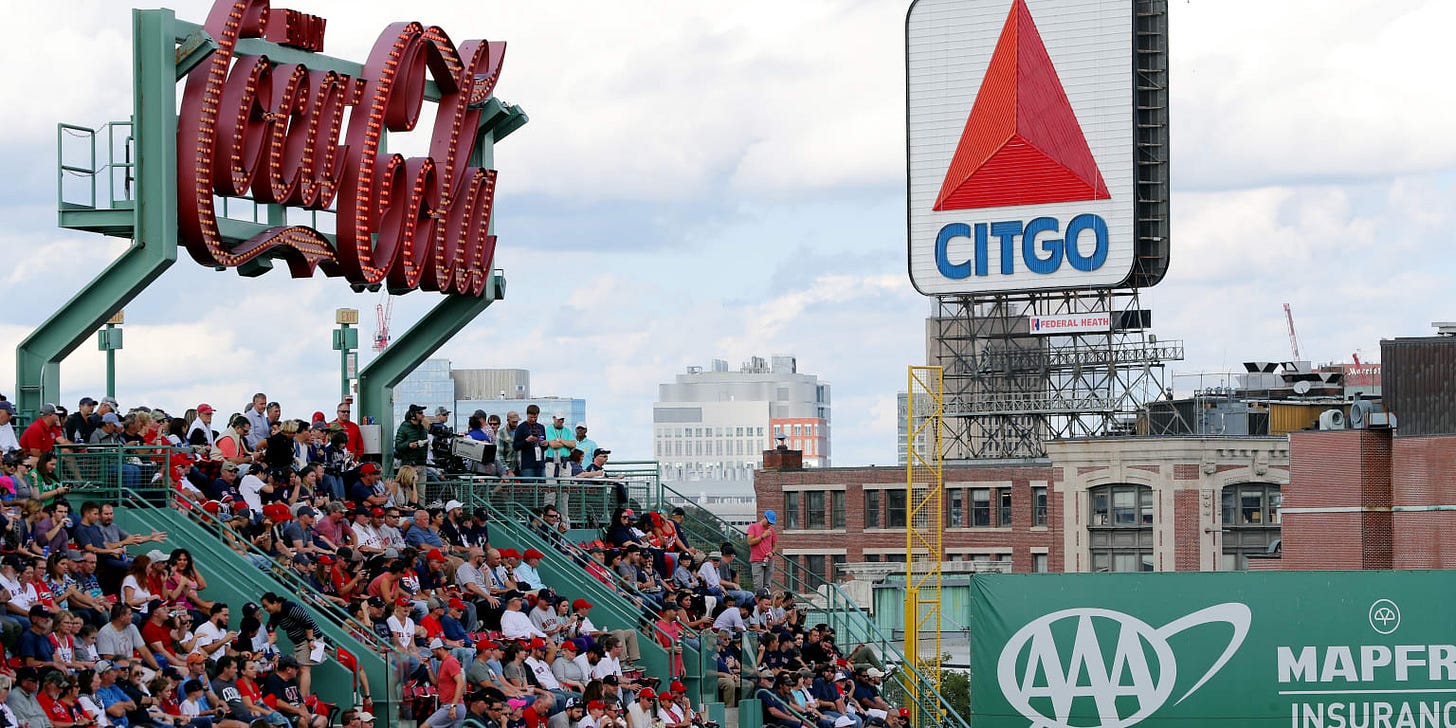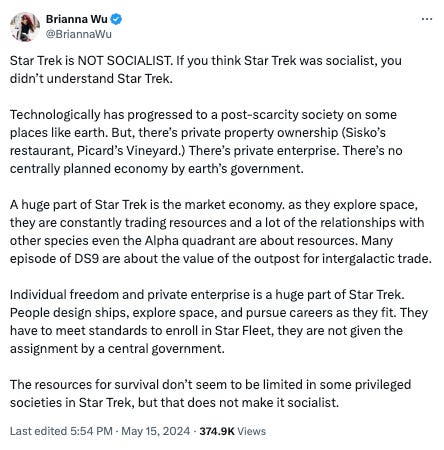You'll Still Be Able to Buy Things Under Socialism
Clarifying a common misconception about markets and socialism.

As part of her attempt to break the world record for the fastest progressive-turned-conservative grifter, Rebellion PAC Executive Director Brianna Wu recently posted this bizarre tweet about socialism and Star Trek.
While Wu’s one-off thought is hardly noteworthy, she does state some common misconceptions about socialism. Amongst other things, she claims the post-scarcity world of Star Trek isn’t socialist because:
There are non-state-run businesses,
Markets exist, and
There’s international (or in this case, intergalactic) trade.
I’m going to put aside her thoughts on Star Trek (I’ve written about Trek previously) and instead focus on her misunderstandings of socialism, particularly its relationship to markets.
Socialism Is Not “No iPhones”
Since beginning this publication, the greatest misconception I’ve encountered is the belief that capitalism is markets and socialism is central planning. This jaded perspective would have one believe that capitalist markets afford the freedom of consumer choice, while socialism limits citizens to whichever goods the government allocates for them. Through this misunderstanding, people assume capitalism allows them to choose between Starbucks or a local coffee shop for their morning brew, while socialism only offers them room-temperature slop from a defunct state-run coffee chain.
In both practice and theory, this is entirely untrue. Markets and central planning are mechanisms of distribution. What distinguishes capitalism from socialism is the process of production. Under capitalism, the means of production (businesses, industries, and natural resources) are privately owned by capitalists, who seek to profit. In a socialist society, these entities would be owned collectively by those impacted by their operations or outputs. Smaller, consumer-focused businesses like coffee shops would be owned and run by their workers, while societally necessary industries such as energy production, agriculture, and healthcare would be owned by the state. The citizenry would control these industries (and the government) through democratic elections.
As they are methods of distribution and not production, markets, and central planning exist side-by-side in both capitalist societies and socialist ones. Markets are plentiful in the capitalist United States but so is central planning. State and federal governments centrally plan the electrical grid to ensure the nation has power. And yet, if you’ve ever paid an electric bill, you know a private company is profiting from this centrally-planned power network, making America’s energy sector both centrally planned and capitalist. Similarly, markets exist in socialist societies, both existing ones, and the proposed economic system socialists such as myself hope to build. Even the Leninist Soviet Union, which is regarded as the most centralized form of socialism, used markets with great success. When the Russian Civil War concluded, Lenin ended the strict central planning of War Communism and implemented the New Economic Policy, reopening markets in the U.S.S.R.’s agriculture, retail, and light industry sectors.

In the form of socialism I advocate for, markets will be used to distribute goods such as coffee, cell phones, and other consumer luxuries. The difference between these markets and those in the current capitalist structure is that businesses in socialist markets are owned and governed by workers via the cooperative model. In a worker cooperative, workers elect managers and board members, vote on key issues, and run their business as a democracy. This is the opposite of the capitalist model, which gives authoritarian control to the business owner(s), who make all decisions without input from the workers. But regardless of a business’s internal structure, how consumers interact with them will remain the same. In a socialist society, you’ll still be able to choose between coffee shops, have a favorite restaurant, and decide if you want a phone with a powerful camera or one with increased memory. The only difference will be that the workers who made, marketed, and sold you these goods will reap the full value of their labor, as opposed to the capitalists who had little to do with helping you obtain your new possession.
Socialism Is Also Not “No Trade”
Wu’s misunderstanding of how markets’ role in socialism bleeds into her bizarre assertion that a socialist society wouldn’t trade with a non-socialist one. (Her Star Trek analysis speaks about planets, but it’s fair to assume she’s extrapolating from terrestrial socialist states.) This is, on its face disprovable, as contemporary socialist states trade with capitalist states all the time. Mexico and Norway, both of which have socialized oil industries, sell oil on the global market. China, Cuba, and Venezuela, all of which are led by socialist parties, buy and sell with capitalist nations all the time (that is when they’re not under U.S. sanctions). In the fully socialist countries I hope will arrive one day in the future, there’s nothing that says products made through collective ownership can’t be sold to foreign markets. Whether a cooperative-made T-shirt is purchased by someone who lives in a capitalist nation or a socialist one is entirely irrelevant to the aim of socialism. As long as those who contributed their labor to making the shirt receive the full value of their work, it does not matter if the garment is distributed by central planning or through a market. It’s still socialism.

The idea socialist states wouldn’t trade with other nations is a strange assertion. Much like her misconceptions about markets, this amounts more to Wu’s misunderstandings of socialism than an actual critique of an economic system that seeks the collective ownership of the means of production.
Given the prevalence of these misconceptions, I suggest you subscribe to JoeWrote to learn more about how socialism would work in practice.
If you enjoyed this article, you can support my work by liking it (click the ❤️ button) and forwarding this email to a friend. Thank you for your support!
In Solidarity — Joe




If people couldn’t have IPhones under a Socialist government that would be a good thing.
If people, for whatever reason, couldn’t buy things, that would be fine. There is entirely too much gack in the world, ie manufactured crap no one needs that give a simulacrum of “pleasure” for about 5 minutes and then end up in a landfill.
I was recently in Denmark which is more Socialist than most countries. The elderly are well taken care of, quality medical care is available, education is free through PhD programs. There is plenty of free enterprise and capitalism. I saw one down and out drunk in Copenhagen and no homelessness. The citizens seemed happy, healthy, appropriately dressed, working, and housed. If this is Socialism, sign me up.
If we must have governments, then their only duty is to work tirelessly to make the citizens happy and healthy.
China is the most economically and politically decentralized country on the Earth. The USA has had private sector central planning for decades, previously it was decentralized, this began to change in the 1930s but didn't change by much until the 1970s. Cosmically ironically, China more closely resembles the American Old Republic than contemporary America does.